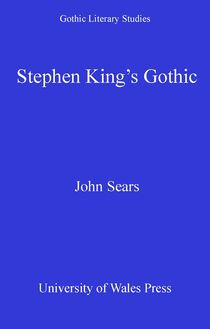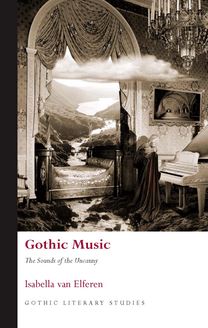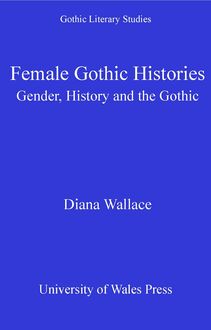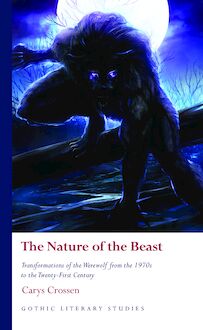-
 Univers
Univers
-
 Ebooks
Ebooks
-
 Livres audio
Livres audio
-
 Presse
Presse
-
 Podcasts
Podcasts
-
 BD
BD
-
 Documents
Documents
-
- Cours
- Révisions
- Ressources pédagogiques
- Sciences de l’éducation
- Manuels scolaires
- Langues
- Travaux de classe
- Annales de BEP
- Etudes supérieures
- Maternelle et primaire
- Fiches de lecture
- Orientation scolaire
- Méthodologie
- Corrigés de devoir
- Annales d’examens et concours
- Annales du bac
- Annales du brevet
- Rapports de stage
La lecture à portée de main
Vous pourrez modifier la taille du texte de cet ouvrage
Découvre YouScribe en t'inscrivant gratuitement
Je m'inscrisDécouvre YouScribe en t'inscrivant gratuitement
Je m'inscrisEn savoir plus
Vous pourrez modifier la taille du texte de cet ouvrage
En savoir plus

Description
Gothic Britain is the first collection of essays to consider how the Gothic responds to, and is informed by, the British regional experience. Acknowledging how the so-called United Kingdom has historically been divided on nationalistic lines, the twelve original essays in this volume interrogate the interplay of ideas and generic innovations generated in the spaces between the nominal kingdom and its component nations and, innovatively, within those national spaces. Concentrating upon fictions depicting England, Scotland and Wales specifically, Gothic Britain comprehends the generic possibilities of the urban and the rural, of the historical and the contemporary, of the metropolis and the rural settlement – as well as exploring uniquely the fluid space that is the act of travel itself. Reading the textuality of some two hundred years of national and regional identity, Gothic Britain interrogates how the genre has depicted and questioned the natural and built environments of the island of Britain.
Acknowledgements
Notes on Contributors
Introduction: William Hughes, ‘The Uncanny Space of Regionality: Gothic Beyond the Metropolis’
Part One: Re-imagined Gothic Landscapes: Folklore, Nostalgia and History
Chapter One: Catherine Spooner, ‘“Dark, and cold, and rugged is the North”: Regionalism, Folklore and Elizabeth Gaskell’s “Northern” Gothic’
Chapter Two: Chloe Buckley, ‘Jeremy Dyson’s The Haunted Book (2012), the Gothic Child and the West Yorkshire Moors’
Chapter Three: Richard Storer, ‘“Spook Business”: Hall Caine and the Moment of Manx Gothic’
Chapter Four: Gioia Angelletti, ‘“All those ancient stories that had their dark souls located in woods”: Rural Gothic, Scottish Folklore and Postmodern Conundrums in James Robertson’s The Testament of Gideon Mack’
Part Two: Unnatural Gothic Spaces
Chapter Five: Timothy Jones, ‘Entering the Darkness: Robert Aickman and the Regions’
Chapter Six: Minna Vuohelainen, ‘University Gothic 1880-1910’
Chapter Seven: Holly-Gale Millette, ‘Vampiristic Museums and Library Gothic’
Part Three: Border Crossings and the Threat of Invasion
Chapter Eight: Jamil Mustafa, ‘Lifting the Veil: Allegory, Ambivalence and the (Scottish) Gothic in Walter Scott’s Union Fiction’
Chapter Nine: Ben Richardson, ‘Cosmopolis Fever: Regionalism and Immunity in Mary Shelley’s The Last Man (1826)’
Chaper Ten: Ruth Heholt, ‘The Hammer House of Cornish Horror: The Inversion of Imperial Gothic in The Plague of the Zombies and The Reptile’
Chapter Eleven: Sara Ilott, ‘Black Immigrant/White Cliffs: Dover Gothic and the Borders of Britishness’
Bibliography
Index
Sujets
Informations
| Publié par | University of Wales Press |
| Date de parution | 15 avril 2018 |
| Nombre de lectures | 0 |
| EAN13 | 9781786832351 |
| Langue | English |
Informations légales : prix de location à la page 0,3450€. Cette information est donnée uniquement à titre indicatif conformément à la législation en vigueur.
Extrait
GOTHIC BRITAIN
SERIES PREFACE
Gothic Literary Studies is dedicated to publishing groundbreaking scholarship on Gothic in literature and film. The Gothic, which has been subjected to a variety of critical and theoretical approaches, is a form which plays an important role in our understanding of literary, intellectual and cultural histories. The series seeks to promote challenging and innovative approaches to Gothic which question any aspect of the Gothic tradition or perceived critical orthodoxy. Volumes in the series explore how issues such as gender, religion, nation and sexuality have shaped our view of the Gothic tradition. Both academically rigorous and informed by the latest developments in critical theory, the series provides an important focus for scholarly developments in Gothic studies, literary studies, cultural studies and critical theory. The series will be of interest to students of all levels and to scholars and teachers of the Gothic and literary and cultural histories.
SERIES EDITORS
Andrew Smith, University of Sheffield
Benjamin F. Fisher, University of Mississippi
EDITORIAL BOARD
Kent Ljungquist, Worcester Polytechnic Institute Massachusetts
Richard Fusco, St Joseph s University, Philadelphia
David Punter, University of Bristol
Chris Baldick, University of London
Angela Wright, University of Sheffield
Jerrold E. Hogle, University of Arizona
Gothic Britain
Dark Places in the Provinces and Margins of the British Isles
Edited by William Hughes and Ruth Heholt -->
UNIVERSITY OF WALES PRESS 2018
© The Contributors, 2018
All rights reserved. No part of this book may be reproduced in any material form (including photocopying or storing it in any medium by electronic means and whether or not transiently or incidentally to some other use of this publication) without the written permission of the copyright owner except in accordance with the provisions of the Copyright, Designs and Patents Act. Applications for the copyright owner s written permission to reproduce any part of this publication should be addressed to the University of Wales Press, 10 Columbus Walk, Brigantine Place, Cardiff, CF10 4UP.
www.uwp.co.uk
British Library Cataloguing-in-Publication Data
A catalogue record for this book is available from the British Library.
ISBN 978-1-78683-233-7
eISBN 978-1-78683-235-1
The rights of The Contributors to be identified as authors of this work have been asserted in accordance with sections 77 and 79 of the Copyright, Designs and Patents Act 1988.
The publisher has no responsibility for the persistence or accuracy of URLs for any external or third-party internet websites referred to in this book, and does not guarantee that any content on such websites is, or will remain, accurate or appropriate.
Cover image: The Decorated Gothic Revival spirelet and churchyard of St Catwg s Church, Pentyrch, Wales. By permission, Richard Downs / Alamy Stock Photo.
This book is dedicated to our friend Nigel Kingcome
C ONTENTS
Acknowledgements
Notes on contributors
Introduction: The Uncanny Space of Regionality: Gothic Beyond the Metropolis
William Hughes
Part I: Re-imagined Gothic Landscapes: Folklore, Nostalgia and History
1 Dark, and cold, and rugged is the North : Regionalism, Folklore and Elizabeth Gaskell s Northern Gothic
Catherine Spooner
2 The Gothic Child and the West Yorkshire Moors: The Deconstruction of Space in Jeremy Dyson s The Haunted Book
Chloé Germaine Buckley
3 Spook Business : Hall Caine and the Moment of Manx Gothic
Richard Storer
4 All those ancient stories that had their dark souls located in woods : Rural Gothic, Scottish Folklore and Postmodern Conundrums in James Robertson s The Testament of Gideon Mack
Gioia Angeletti
Part II: Unnatural Gothic Spaces
5 Entering the Darkness: Robert Aickman and the Regions
Timothy Jones
6 University Gothic, c. 1880-1910
Minna Vuohelainen
7 Vampiristic Museums and Library Gothic
Holly-Gale Millette
Part III: Border Crossings and the Threat of Invasion
8 Lifting the Veil: Ambivalence, Allegory and the Scottish Gothic in Walter Scott s Union Fiction
Jamil Mustafa
9 Cosmopolis Fever: Regionalism and Disease Ecology in Mary Shelley s The Last Man
Ben Richardson
10 The Hammer House of Cornish Horror: The Inversion of Imperial Gothic in The Plague of the Zombies and The Reptile
Ruth Heholt
11 Gothic Immigration: Kentish Gothic and the Borders of Britishness
Sarah Ilott
Bibliography
A CKNOWLEDGEMENTS
We would like to thank Sarah Lewis for her cheerful and good-natured support of this project.
N OTES ON C ONTRIBUTORS
Gioia Angeletti is Associate Professor of English Literature at the University of Parma, Italy. She has published a wide range of essays and articles in international journals on nineteenth-century English and Scottish poets and playwrights, and contemporary Scottish literature. Her publications include: Eccentric Scotland: Three Victorian Poets. James Thomson ( B. V. ), John Davidson and James Young Geddes (2004), Lord Byron and Discourses of Otherness: Scotland, Italy, and Femininity (2012), and the edited book Emancipation, Liberation, and Freedom: Romantic Drama and Theatre in Britain, 1760-1830 (2010). She is currently working on two book-length studies respectively on Romantic-period Scottish migration literature and contemporary Scottish women playwrights.
Chloé Germaine Buckley is a Senior Lecturer at Manchester Metropolitan University. Her publications include: Twenty-First Century Children s Gothic Fiction: From Wanderer to Nomadic Subject (Edinburgh University Press), Telling it Slant: Critical Approaches to Helen Oyeyemi (co-edited with Sarah Ilott), and various chapters and articles on aspects of the Gothic, including children s fiction, the Gothic child, the Weird, gender and the Gothic, and representation of Witches in popular culture.
Ruth Heholt is Senior Lecturer in English at Falmouth University. She has published on ghosts, the Gothic, masculinity and crime fiction. She works on Victorian literature and culture as well as contemporary texts. She is founding editor of Revenant: Critical and Creative Studies of the Supernatural , a peer reviewed online journal ( www.revenantjournal.com ). She has published a critical edition of Catherine Crowe s 1847 novel The Story of Lilly Dawson (2015) and is co-editor of Haunted Landscapes: Supernature and the Environment (2016). She is working on a monograph on Catherine Crowe and has a collection: The Victorian Male Body , edited with Joanne Ella Parsons forthcoming with Edinburgh University Press.
William Hughes is Professor of Gothic Studies at Bath Spa University, and a Past President of the International Gothic Association. He is the author, editor or co-editor of seventeen books including: Beyond Dracula: Bram Stoker s Fiction and its Cultural Context (2000), Dracula: A Reader s Guide to Essential Criticism (2009), The Historical Dictionary of Gothic Literature (2013) and That Devil s Trick: Hypnotism and the Victorian Popular Imagination (2015); and the collections Empire and the Gothic (2003), Queering the Gothic (2009), Victorian Gothic (2012) and Ecogothic (2013), all co-edited with Andrew Smith. He is the editor of the journal Gothic Studies , and is currently writing a monograph on phrenology.
Sarah Ilott is a Research Lecturer at Teesside University, UK. Her main research and teaching interests are in postcolonial literature and genre fiction, particularly comedy and the Gothic. She has recently published her first monograph, entitled New Postcolonial British Genres: Shifting the Boundaries (Palgrave, 2015). This study analyses four new genres of literature and film that have evolved to accommodate and negotiate the changing face of postcolonial Britain since 1990. She has also published journal articles on postcolonial literature, multicultural screen comedy, and the Gothic in the Journal of Commonwealth Literature , the Journal of Postcolonial Writing , and Postcolonial Text.
Timothy Jones is a lecturer at the University of Stirling, where he is co-director the Gothic Imagination postgraduate programme. He is the author of The Gothic and the Carnivalesque in American Culture (University of Wales Press, 2015), which was awarded the Allan Lloyd Smith Memorial Prize. He received his PhD from Victoria University of Wellington, New Zealand.
Holly-Gale Millette is a Senior Teaching Fellow at the University of Southampton, UK. She is a Cultural, Performance, and Social Historian. She has articles in several prominent international journals, has contributed essays and curation to several collaborative projects and is working on her monograph. Her research is concerned with spaces of transition and with the deep mapping of chronotopes, palimpsests and ruptured space that regularly interbreed with gender, class and politics. Outside her monograph, Holly-Gale s current writing is centred on Gothic and Neo-Victorian cultures.
Jamil Mustafa is Professor of English Studies at Lewis University. Prior and forthcoming publications include essays on the Gothic works of Thomas Hardy, Angela Carter, Oscar Wilde, and Ray Bradbury, together with studies of neo-Victorian film and television, adaptations of Jekyll and Hyde , and Supernatural . His short story, Vicious Circle , was published in The Horror Zine , where he was the featured author. He is currently writing a monograph on psychology, cartography and the Gothic novel in the late-Victorian period.
Ben Richardson is a PhD candidate in English Literature at Duke University. His work currently investigates the relationship between natural science and the history of political theory in Victorian and Modernist writing. Focusing on the Victorian novel, his dissertation - tentatively entitled Moveable Type: Biological Politics, Victorian Liberalism, and the Science of Difference - specifically examines the way in which realist fiction beca
-
 Univers
Univers
-
 Ebooks
Ebooks
-
 Livres audio
Livres audio
-
 Presse
Presse
-
 Podcasts
Podcasts
-
 BD
BD
-
 Documents
Documents
-
Jeunesse
-
Littérature
-
Ressources professionnelles
-
Santé et bien-être
-
Savoirs
-
Education
-
Loisirs et hobbies
-
Art, musique et cinéma
-
Actualité et débat de société
-
Jeunesse
-
Littérature
-
Ressources professionnelles
-
Santé et bien-être
-
Savoirs
-
Education
-
Loisirs et hobbies
-
Art, musique et cinéma
-
Actualité et débat de société
-
Actualités
-
Lifestyle
-
Presse jeunesse
-
Presse professionnelle
-
Pratique
-
Presse sportive
-
Presse internationale
-
Culture & Médias
-
Action et Aventures
-
Science-fiction et Fantasy
-
Société
-
Jeunesse
-
Littérature
-
Ressources professionnelles
-
Santé et bien-être
-
Savoirs
-
Education
-
Loisirs et hobbies
-
Art, musique et cinéma
-
Actualité et débat de société
- Cours
- Révisions
- Ressources pédagogiques
- Sciences de l’éducation
- Manuels scolaires
- Langues
- Travaux de classe
- Annales de BEP
- Etudes supérieures
- Maternelle et primaire
- Fiches de lecture
- Orientation scolaire
- Méthodologie
- Corrigés de devoir
- Annales d’examens et concours
- Annales du bac
- Annales du brevet
- Rapports de stage




















